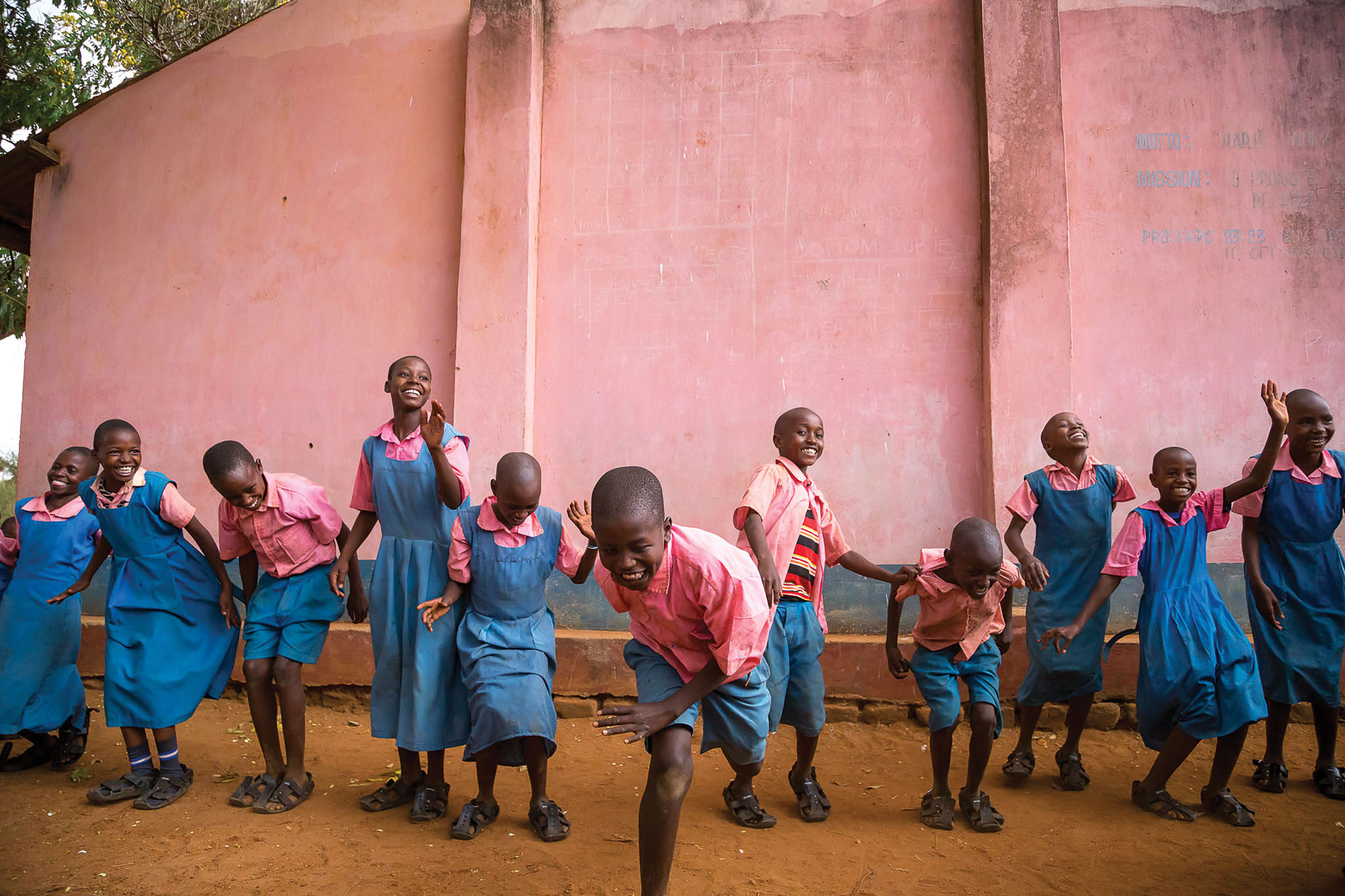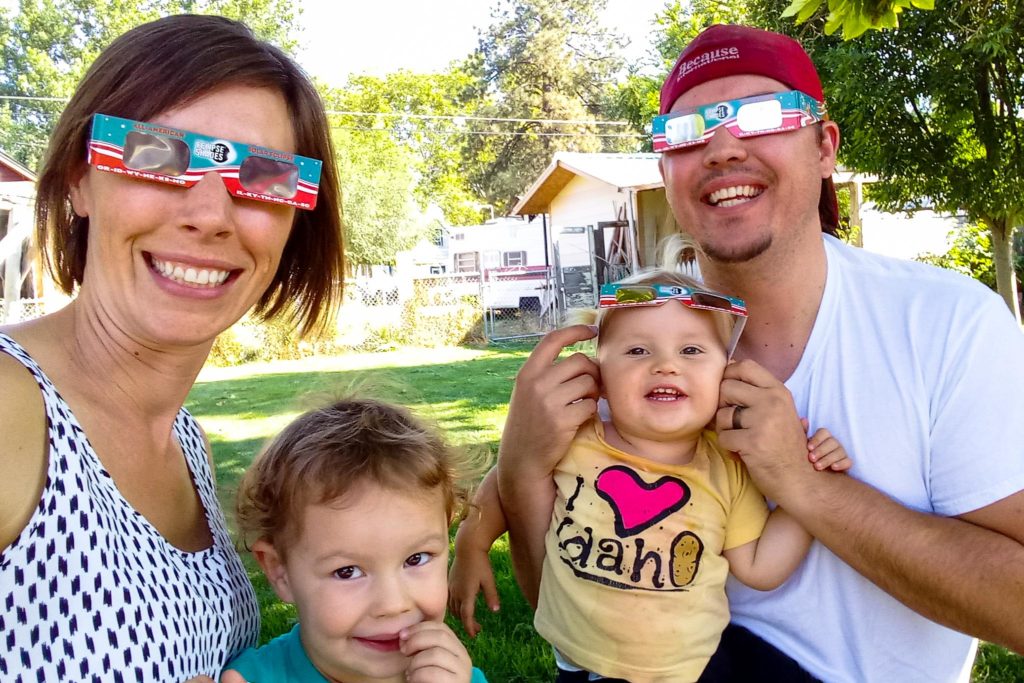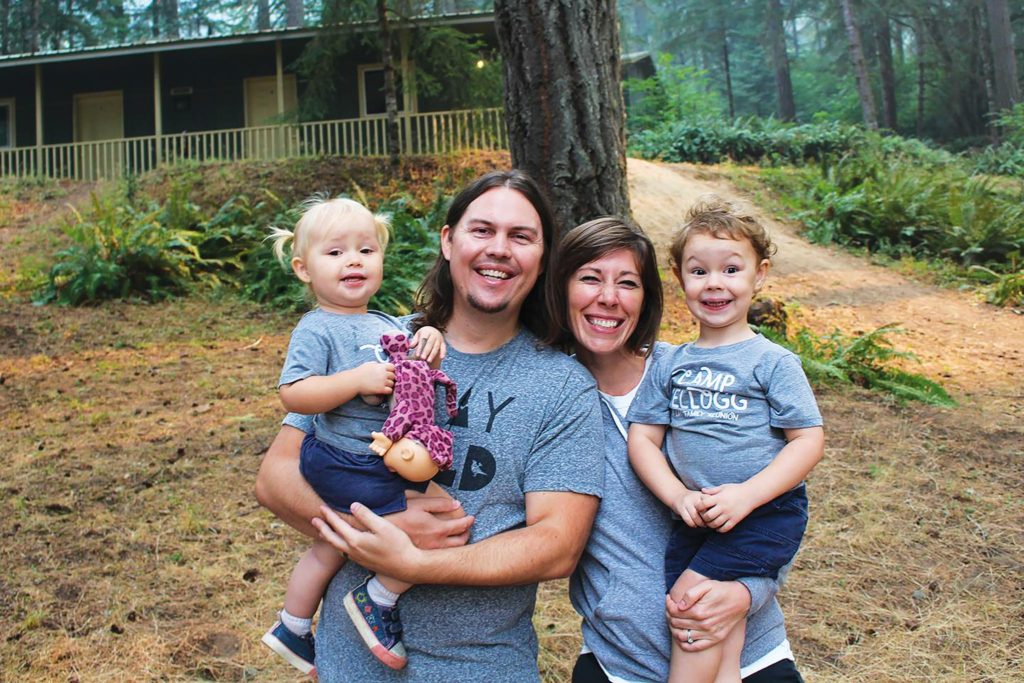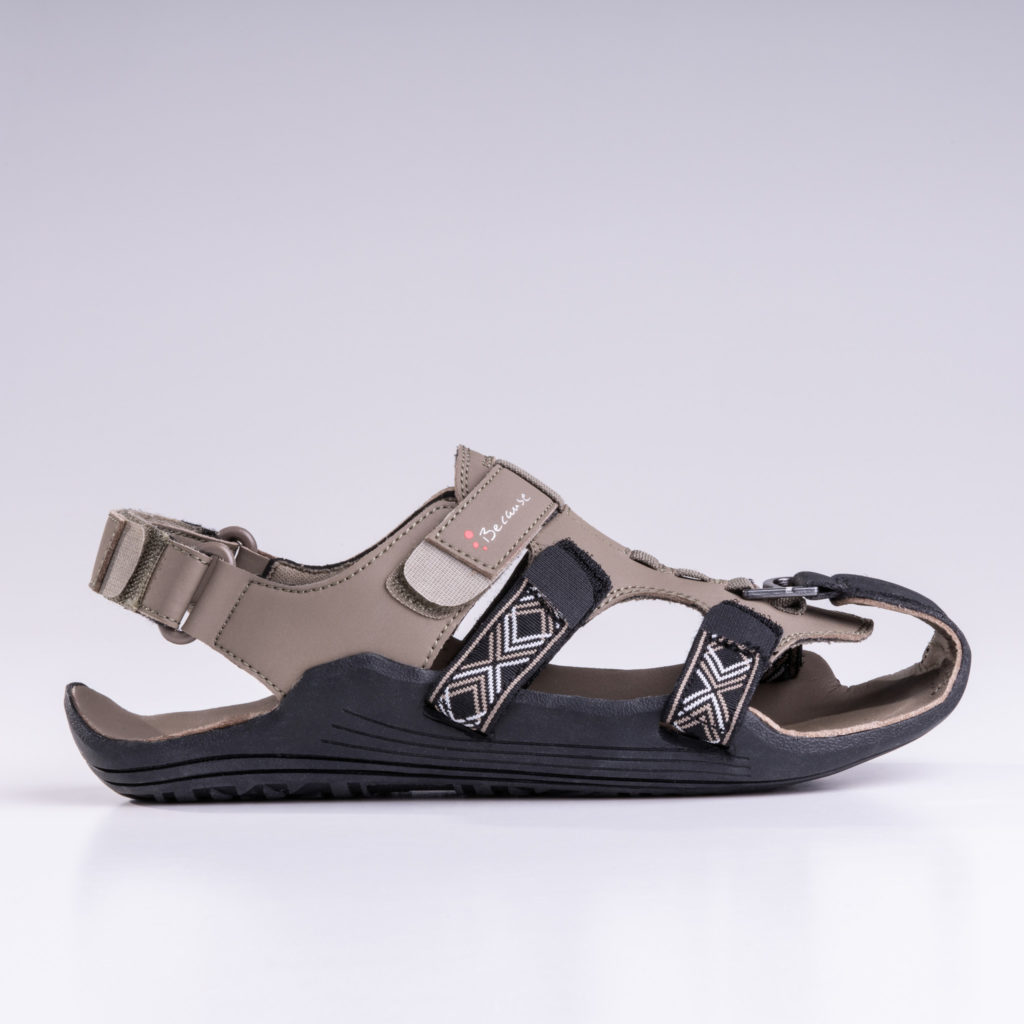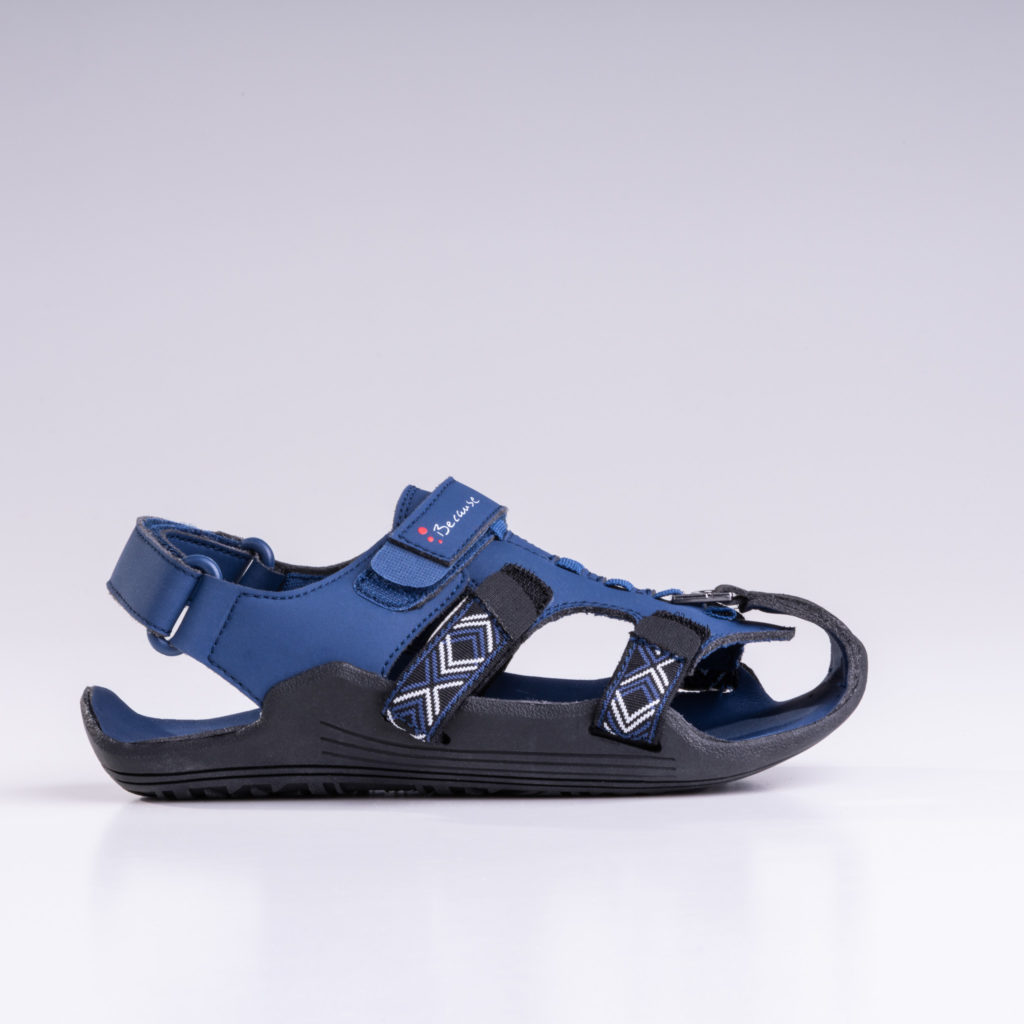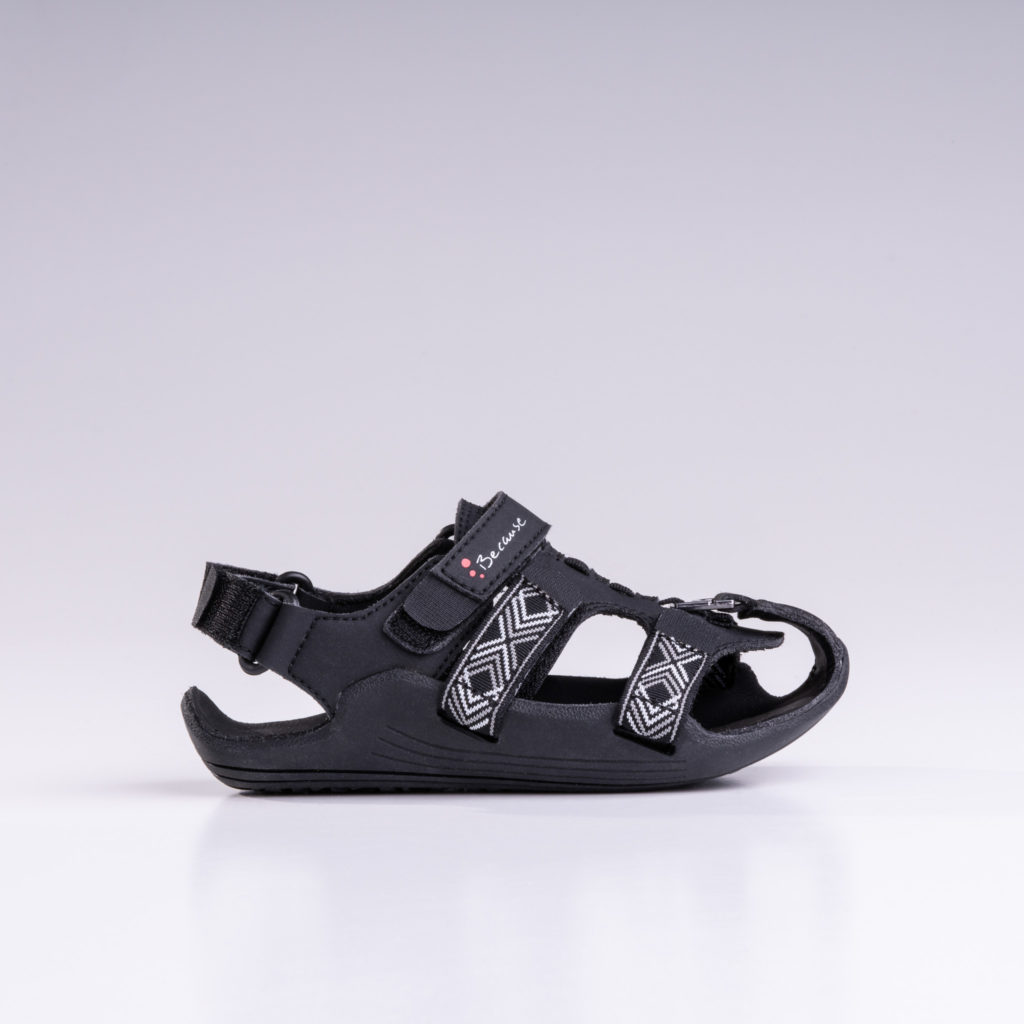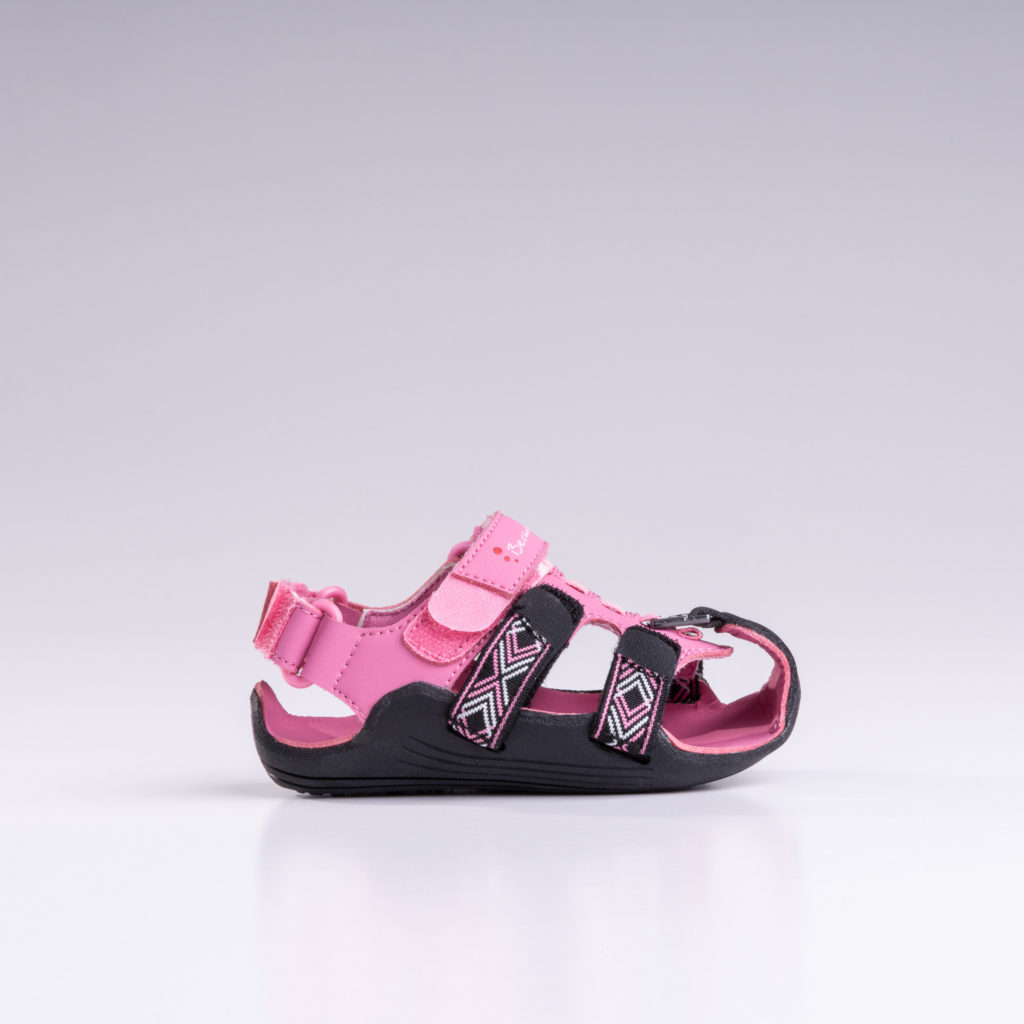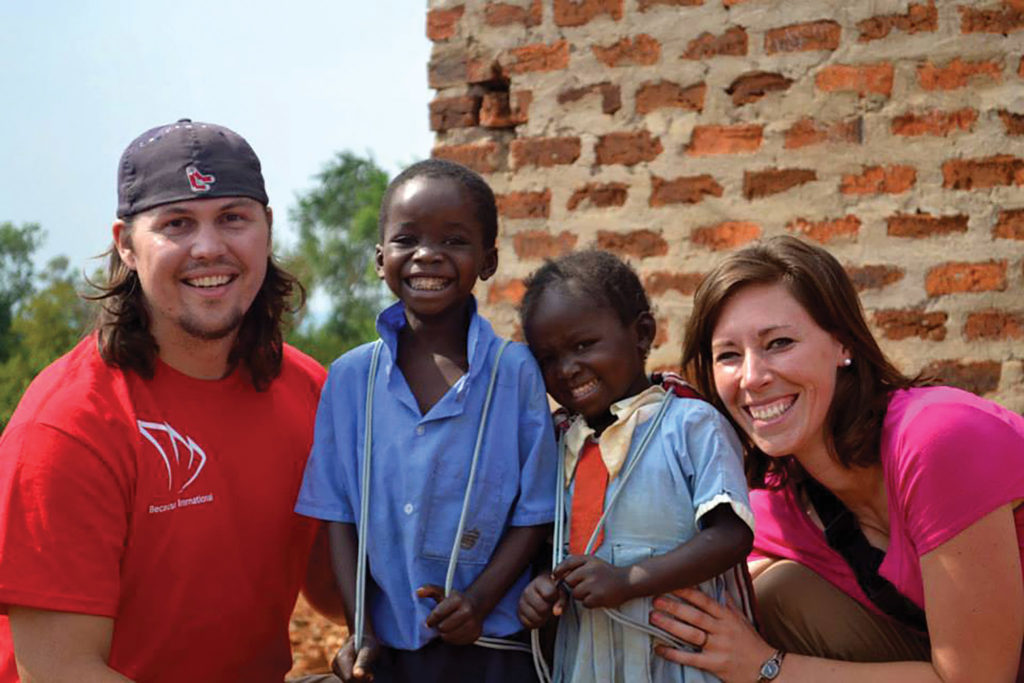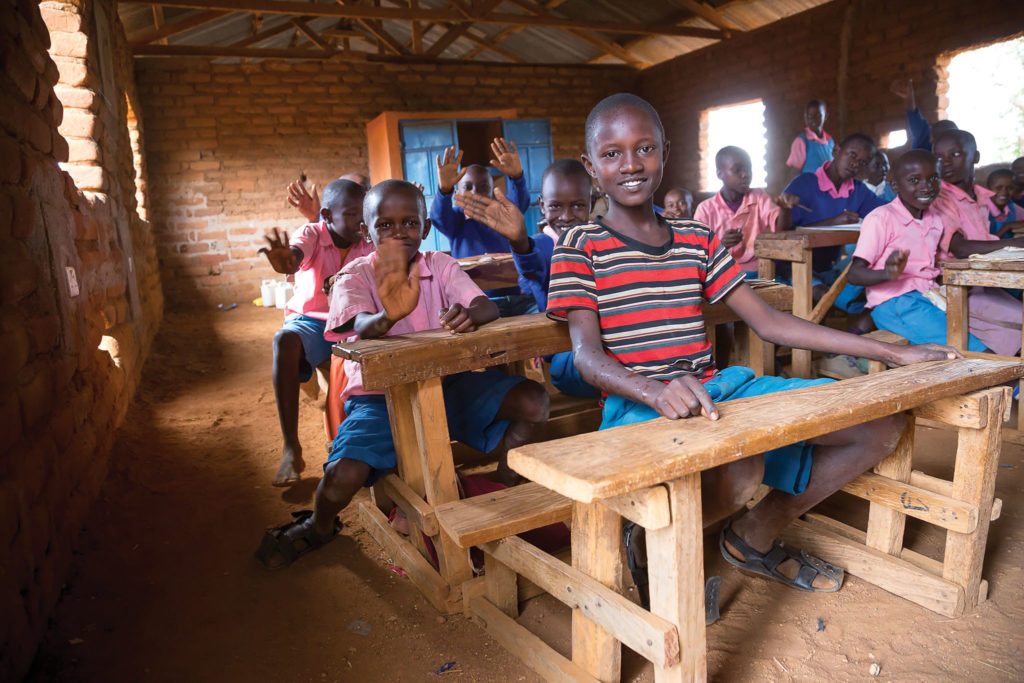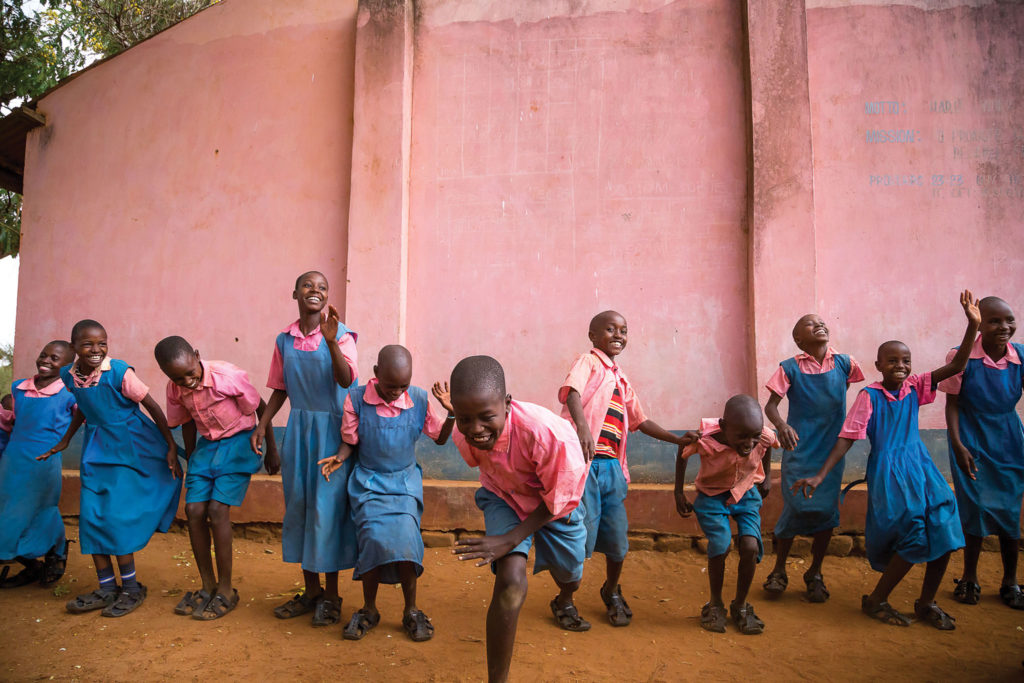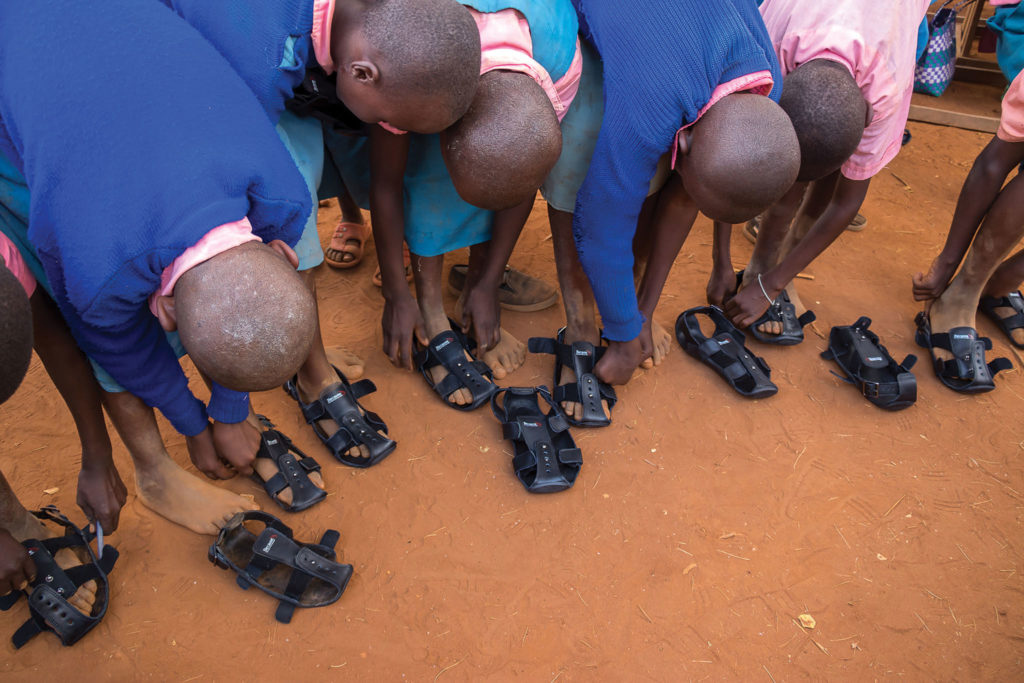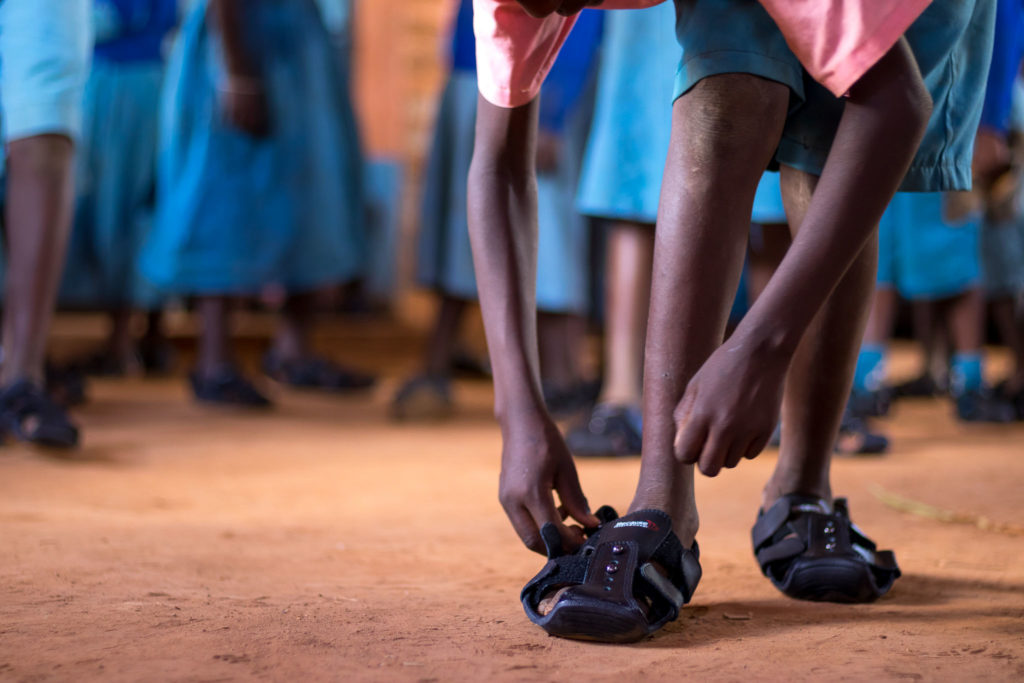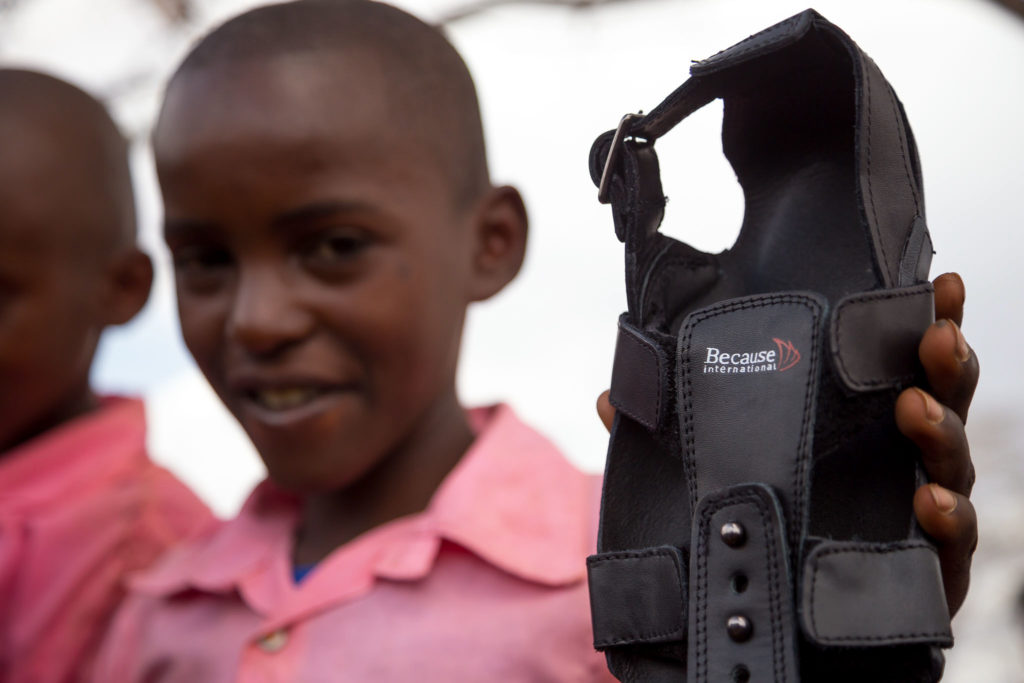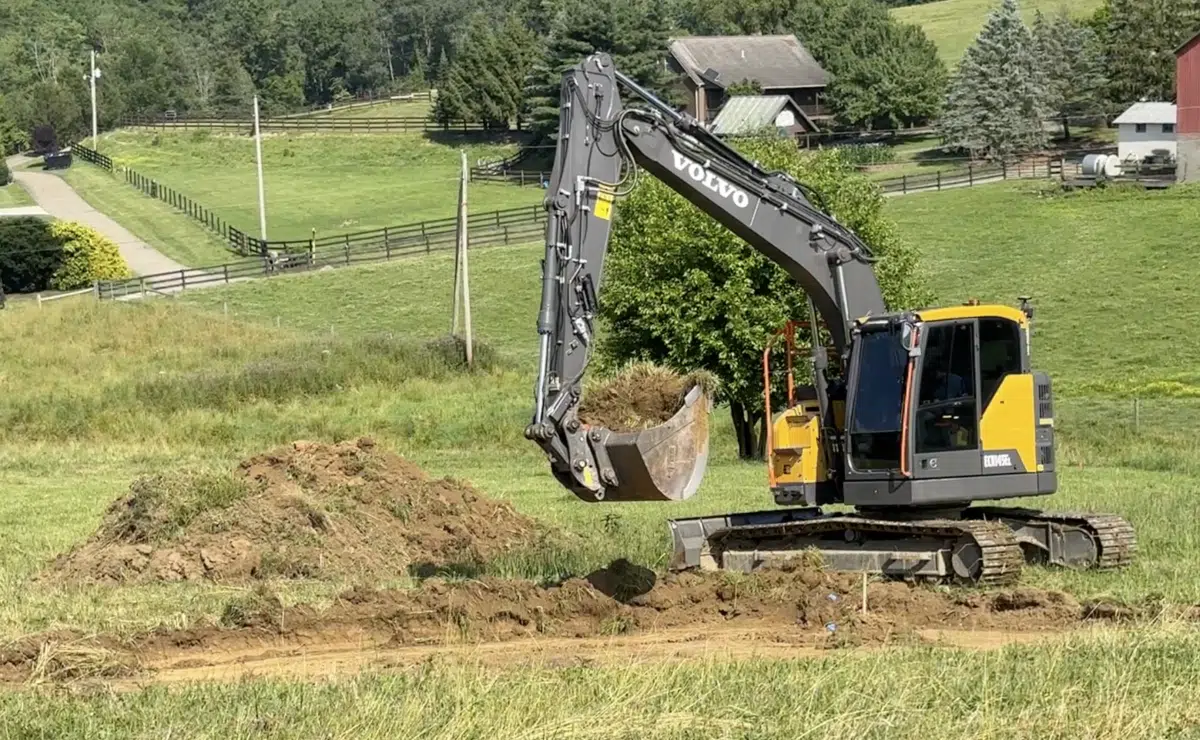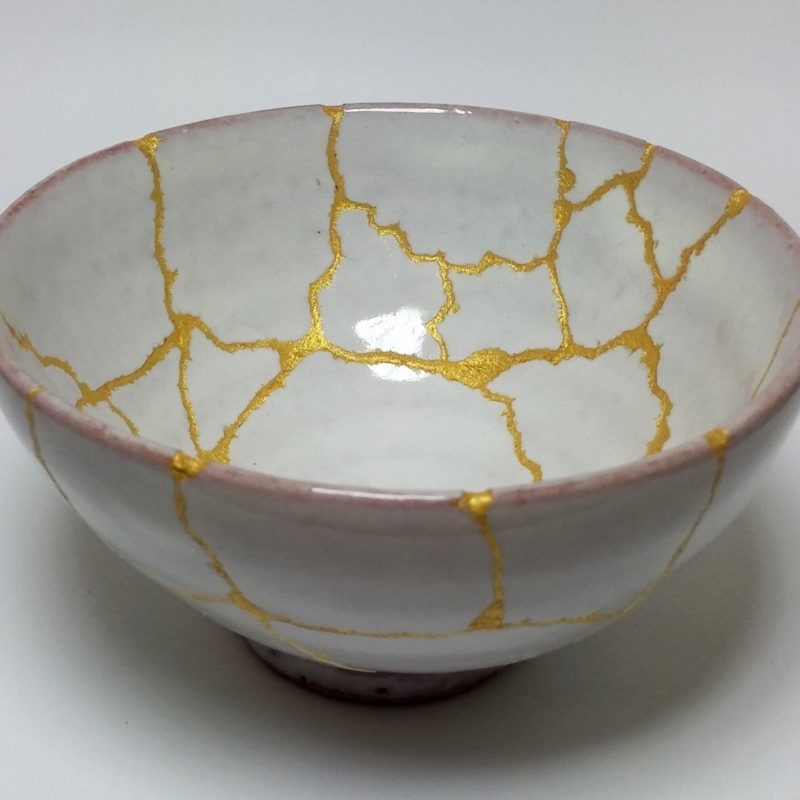by: Karen Raber
The desert air lies heavy with dust churned by thousands of tired, marching feet. God’s chosen people, the Israelites, travel through the wilderness. They find many reasons to complain. It’s hot. There’s no water. The food is boring.
Something they can’t complain about? Their sandals. To be sure, their sandals were dust-caked and sweaty, but the Lord was working a miracle beneath their very feet, and it seemed to them a small thing. Their sandals were new!* As new as the day they had left Egypt many, many months earlier—no trace of wear, no size too big or small. Just right.
That was in the Old Testament, of course, but have you ever questioned why God doesn’t still keep shoes from wearing out? Wouldn’t that provide one less concern for the many impoverished on our planet? Maybe it’s because God desires us to represent Him to the poor—to show them His love with kind words and… shoes.
That’s Kenton Lee’s very mission. Kenton was raised in Nampa, Idaho. His family never traveled much outside of the United States, but Kenton had big dreams—dreams of being a missionary when he grew up. He was drawn to helping people around the world. So, when Kenton was ready for college, he chose to pursue becoming a missionary. After graduating from Mt. Vernon Nazarene University in Ohio, he thought he should see if he could handle being a long-term missionary by spending a six-month term in both Kenya and Ecuador. It was plenty long enough for Kenton to realize that he couldn’t handle being away from his family. He was terribly homesick. Still, he longed for a way to help from Idaho.
- Kenton Lee Family
- Kenton Lee family
While he was serving at an orphanage in Kenya, a surprising thing happened: God provided Kenton with the inspiration of how he could help from home. The orphanage was located outside Nairobi and housed 140 children. One hot Sunday, the staff and children were walking down the dusty road to church. Kenton was walking beside a little girl dressed in a beautiful white dress, but when he looked down at her feet, he was shocked at how small her shoes were. They were so small that they had been cut open in front to allow her toes some extra room. Kenton glanced around at the other children’s feet. He noticed that most of the children had no shoes or shoes that were too small. Why hadn’t he noticed before? After church, Kenton asked the director of the orphanage why so many of the children had no shoes or a pair that didn’t fit. The director’s answer was simple and forthright; there was no money for shoes because their budget was already stretched to feed 140 children. The last donation of shoes had come a year earlier, and the orphanage couldn’t afford to buy new shoes every time the children’s feet grew. “And kids’ feet are always growing,” he added.
Kenton was struck by their unstable access to footwear and especially by the director’s last remark. It was one constant he had forgotten about—children’s feet are always growing! He began to imagine how nice it would be to have shoes that
could adjust and expand; shoes that grew with the feet wearing them. Kenton never believed himself to be an inventor, so he was surprised by the idea. He wrote it down in his journal, but he didn’t immediately realize that this was an avenue of service he could pursue.
When Kenton arrived home in Idaho, he had learned so many things about the world and himself. He knew he couldn’t be a full-time missionary, but he kept wondering what he could do that would have an impact on the people he had met and the places he had been. The idea of a growing shoe kept coming back to his mind. Did he want to spend time pursuing it? If he did, he wanted to do it well. He pulled out his journal again and began to make lists of pros and cons. The list of pros started out something like this:
I really want to do this:
Because I love these children.
Because I want to help them go to school, be healthy, and succeed.
Because I really do have the time to pursue this.
Because I can do this…
As he compared his lists of pros and cons, he knew the pros list was the kind of person he wanted to be. He decided to go with it. First, he did some research to see if there was anything like a growing shoe out there. He had no desire to “reinvent the wheel.” In his travels, he had seen so many great ways people were helping others and he didn’t want to reinvent what someone else was already doing. But there was no growing shoe to be found. He began to think, You know, this shoe idea could become fun! Maybe there are other products that need to be invented or improved. He decided to build some structure around his idea.
He shared his idea with some of his friends, and together they started a non-profit organization. They chose the name Because International since every entry on Kenton’s pros list had started with the word “because.” Kenton thought the name would be a good reminder of his initial list of reasons to pursue the idea of a growing shoe.
Kenton and his friends knew nothing about making shoes, so the first thing they did was look for shoe manufacturers who would be interested in making the shoes for them. They contacted every major company they could think of—thirty in all. They explained Kenton’s story, his idea, and what their objectives were. The answer? Thirty emphatic no’s. Each company said it wasn’t a good idea and it would never work.
Kenton wasn’t convinced. Maybe they hadn’t explained it well enough. They decided to try again. This time they made a small video showing the conditions in which the children live, how an adjustable shoe could make a difference, and how they wanted the shoe to adjust. The result? Thirty more resounding no’s.
Kenton’s group decided that if no one wanted to help, they would do it themselves. They went to a local thrift store, purchased a bunch of shoes, and took them to Kenton’s garage. There they began to cut them up and piece them back together, trying to make a prototype of the idea in his head. The garage soon housed the world’s worst shoe prototypes. They had no idea what they were doing and realized this would never work. The big companies wouldn’t help, and now they knew they couldn’t do it alone. Who could help?
It was then that a member of their local Chamber of Commerce referred Kenton to an acquaintance who couldn’t help but suggested someone else. After several referrals, he was finally led to a shoe-designing business in Portland. The owner, Gary Pitman, had worked for Nike in the past but had now started his own company called Proof Of Concept. Kenton showed Gary his idea. Gary loved it and thought it was a great way to help others. He was their first contact who really thought he could make the project happen. Kenton was thrilled.
Gary and his team at Proof Of Concept led Because International through a year-long design process. It started with a hundred different ideas of how a shoe could grow, and then was narrowed to the one that worked best, and a prototype was made. Meanwhile, Kenton’s organization did some fundraising in Nampa to have 100 pairs made.
- Adult shoe sizes – Shoes that Grow
- Size medium – Shoe that Grows
- Size small – Shoe that Grows
- Childs Shoe – Shoes that grow
Then came the exciting part! After five years of hard work, it was time to distribute the shoes and have them tested. Kenton and his wife, Nikki, took the shoes back to Kenya and distributed them to children at four different schools. At the first school, a Kenyan friend helped Kenton explain to the children how the shoes adjusted and that they could wear them and try them out. After the explanations, the Lees were helping the children put them on when a Kenyan mother tapped Kenton on the shoulder. She had come in late and asked if he could explain how the shoes worked. Kenton took a pair and briefly demonstrated how they adjusted. At first, she was skeptical, but as he showed her how they grew at the back, front, sides, and top, the materials they used, and what their goals were, Kenton could see a wave of understanding move across her face. She told him how important those shoes were for her people and that he needed to get them out to as many children as possible. Kenton had been expecting his fondest memory of the day to be the happy faces of the children, but it turned out to be the memory of this mother. The opportunity to talk to a mom, have her understand the concept, and hear her affirmation has been a lasting memory for Kenton and a huge motivation!
The children were to wear their shoes for a year, then provide Because International with some feedback. With that feedback, the shoes were revised, and the factory produced 3,000 pairs. After six years of ups and downs, the first batch of shoes was ready for distribution!
The Shoe That Grows can grow five sizes, comes in four colors, and is made with very durable material to make them last as long as possible. Because International doesn’t guarantee how long they last due to varied living conditions, but children have worn them for five years. Kenton himself wears a pair every day, and they are still going strong after more than four years! The shoes are available in five
different sizes, which range from a toddler of two or three years of age to a men’s size thirteen. Any feet within that range can be fitted with The Shoe That Grows.
Kenton was working as a full-time pastor of their local church, and at first, the shoes were only a hobby he was passionate about. He kept the shoes in their guest bedroom, and when he heard of someone going on a mission trip or of missionaries who worked with children, he would give them shoes to distribute. Then one day, Because International unintentionally became very popular! In April of 2015, an article was published about their organization, and though they hadn’t been expecting much to come of it, the story generated lots of public interest. Soon other platforms, sites, and news agencies picked up the story, and nearly over-night, Because International outgrew Kenton’s guest bedroom. Since then, 300,000 pairs of shoes have been distributed through 2,500 partners in 103 countries! “It still surprises me,” Kenton says, “It’s been a crazy ride these past four years.” Several months after this astounding spike in interest, Kenton resigned from his position at the church and started working with the shoes full-time. Because International now has a team of seventeen dedicated and wonderful people.
One of the next goals was not just distribution, but producing the shoe where they’re being used the most in order to bring as many jobs as possible to those areas. Currently, the shoe is produced in Ethiopia and Kenya, and one full-time person works at the warehouse in Nairobi. In just the last two years, 40,000 shoes have been produced in East Africa, and 60 jobs were generated through their production. “We are so excited about that,” said Kenton, “It’s been such a blessing to do that.” The next project is scheduled for Haiti and several other areas of the world.
Although Because International is very excited about The Shoe That Grows, they know that shoes don’t solve every problem. Kenton says, “We like to say that our shoes are a small thing that can make a big difference.” When Kenton first visited Kenya and Ecuador, he was overwhelmed with all of the challenges the nationals faced. Where could you even start addressing them? They faced challenges with their health, the economy, and the government. What could one person do to help? But then God gave him the idea for shoes, and Kenton began to see what a huge difference a pair of shoes could make for a child. Many children need shoes before they can attend school, and since many cannot afford them, it jeopardizes their education. Health problems are another major concern. A pair of shoes also provides something else; happiness. Kenton has seen many children’s faces break into a smile when they received their very own pair of shoes. Kenton decided he could choose to be overwhelmed and do nothing, or do a small thing that can make a huge difference. If a pair of shoes could help children be healthy, attend school, and be more confident and happy, then he was committed to making it happen. Because International also loves bringing in the jobs the shoe manufacturing provides. The small things really can make a big difference, even if they don’t solve every problem. This is why their team motto is, “We believe in small things!”
- Kenton Lee and his wife share a smile and a laugh with young children.
- Young school children smiling.
- Dancing shoes
One of Kenton’s favorite shoe stories happened in Uganda. Twenty-five pairs of shoes had been sent there with a missionary named Eddie. Eddie knew this area in Uganda well, and he knew several children who needed shoes. One eleven-year-old boy named Tony was especially impoverished. Both of Tony’s parents had passed away and he was living with his grandmother, who also cared for several other children. Tony often went without necessities because there was no money. When Eddie gave Tony a pair of shoes, he could tell by the way Tony’s eyes lit up that he was thrilled. He was also very quiet. That surprised Eddie, but he finished passing out shoes and went about his business. Several weeks later he answered the phone and heard Tony’s voice. Eddie was shocked. He was sure something must be wrong because Tony didn’t have a phone and had never called him before. All Tony wanted was to say was, “Thank you.” He wanted Eddie to know that he loved his shoes, and they were his favorite possession. Tony had worked for someone all day, carrying water from the river to the village, so that he could earn enough money to place a phone call to thank Eddie. Eddie was touched, and sent the story to Kenton.
Kenton says, “These children are such great kids. They are so appreciative and hardworking. They want to go to school, they want to be healthy, they want to succeed, but often they just lack a few resources to help them get there. We are so pleased to be getting resources to these children.”
Nearly a year ago, the team at Because International paused to evaluate where they were going with the organization. Was it all about their shoes, or were there other products that needed to be invented or improved? Kenton didn’t feel he would ever have another idea like The Shoe That Grows, but maybe others had great ideas and could use some help working through the difficulties of getting started. Hadn’t they seen first-hand how difficult it was to take a project from an idea to a finished product? This sparked another department at Because International, and in January of 2019, the Pursuit Incubator was launched with the goal of working with global entrepreneurs who have ideas that could make a difference. So far, they have worked with fifteen entrepreneurs around the world. The Pursuit Incubator provides an online training program, weekly phone calls with a business coach, and also connects these entrepreneurs with mentors from their area who understand the dynamics of business in their country. Kenton says, “We have so enjoyed helping entrepreneurs who are in the early stages of their product ideas. Many of their challenges are what we went through in the past few years. We aren’t perfect, but we have received a lot of experience through our own challenges of creating, manufacturing, and selling. We feel this will be a big part of our work as we move forward. We are so happy to help these people launch their ideas and help them do what we are doing with our shoes; creating products that have value, and then creating jobs that help the economy through the business of these products.”
- Trying on shoes.
- A young boy makes adjustments to his new shoes.
- A new recipiant of the Shoe that Grows.
One of these products is a school uniform for girls in Togo, Africa. To attend the schools in Togo, children need to be dressed in the school’s uniform; for many girls living in rural areas, this is a hardship. A lady living in Togo had an idea for a school uniform that could adjust and grow by lengthening at the shoulders and
waist, as well as at the bottom of the skirt. Just recently, 200 girls started wearing these uniforms. It’s the first batch, and everyone is excited to see how they will work out. It ties in well with The Shoe That Grows, but Kenton is quick to assure that they don’t just work with products that grow.
A young lady in Uganda created another product that is in the perfecting stage. She invented a soap containing a mosquito repellant. Her idea was born out of a desire to help when she saw so many people in her community get sick with malaria. Most of these people had a net to sleep under at night but had no protection against mosquitos during the day. Her desire was to create a product that would give them a measure of defense during the day. Currently, her soap has repelling power for six hours. She’s working on strengthening her soap, lengthening its effective repellant time, and getting it out to as many people as possible.
Kenton says, “We are so honored to work with these entrepreneurs. Hopefully, they can avoid some of the mistakes we made, and if we can help them get their products out faster and better, then that’s our main goal. We don’t want to see any good idea be wasted. That’s the heartbeat of our Pursuit Incubator.”
Because International is celebrating its ten-year anniversary as a non-profit organization. Kenton and his team enjoy interacting with people who distribute their shoes.
Who are these distributors? Some are missionaries, some are church groups, some are individuals traveling around the world, and all are people like you—people who care about children in need. The shoes are funded by selling them to distributors for twenty dollars per pair, which provides a little more than half of the revenue, while 40 percent is generated by fundraising and working with major donors. Many groups work toward a goal of distributing fifty pairs of shoes. Some groups are able to fund this on their own, while others appreciate the assistance of the organization to help them raise the funds. “Sometimes it takes several months for a group to raise the funds, but we love connecting with people and figuring out why they are interested and what gets them going or what they are passionate about,” said Kenton.
Would providing shoes to children traveling through a desert in their lives resonate with you? You can help! These shoes may not last for forty years, but they could help to bring these children to the other side of their wilderness. The team at Because International would love to hear from you.
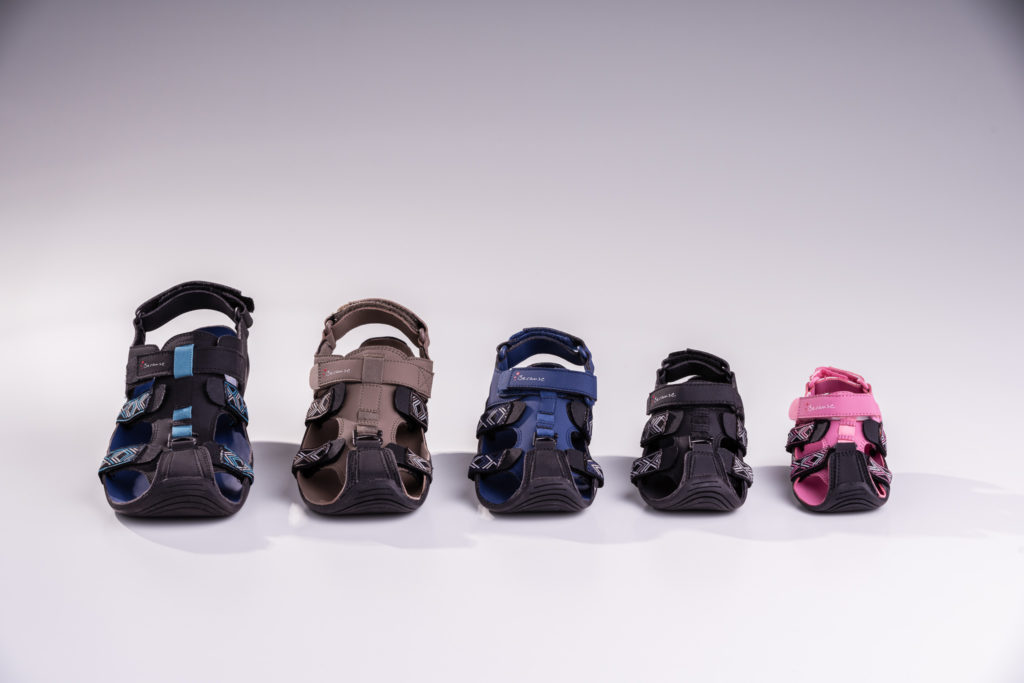
Because International
120 9th Ave South, Suite 110, Nampa, ID 83651
Phone: (208) 697-4417 • www.becauseinternational.org
* Deuteronomy 29:5

